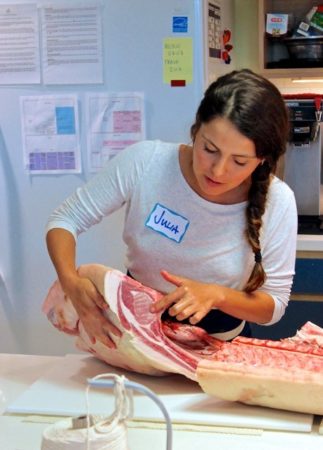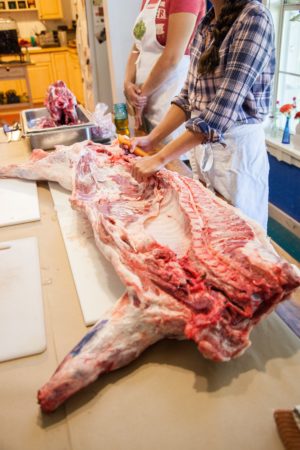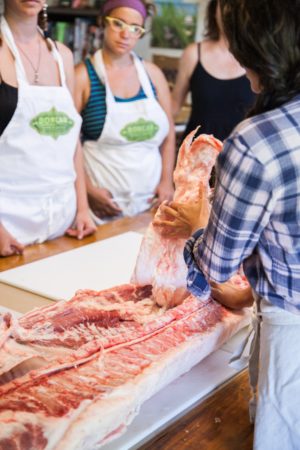Austin butcher Julia Poplawsky takes her knowledge from the cutting table to the classroom.
By Mikaila Rushing, Photos by Adrienne Lee Farmer and Elizabeth Winslow
Julia Poplawsky is slight of frame, standing at just 5 feet 2 inches, which, understandably, made it difficult the first time she cut into a slab of beef that was as tall as she is on the butcher’s table at San Francisco’s 4505 Meats. To even lift a portion of the carcass takes an inordinate amount of strength and maneuvering, but she wanted to prove she could do this, that she has what it takes to be a whole-animal butcher. She turned to the butcher’s assistant, a job she had been denied because she did not have a “butcher’s build,” and asked for advice.
 The new assistant butcher shrugged and said, “Get better.”
The new assistant butcher shrugged and said, “Get better.”
Every time after that exchange, Poplawsky asked for the beef round on the butcher’s table and did indeed get better.
Poplawsky is the 29–year–old co-founder of the Central Texas Meat Collective, an organization that provides hands–on butchery classes to the public and teaches people about where their food comes from. She started the collective with Leah Gibson, the co-owner of Boxcar Farm & Garden in San Marcos, Texas.
Poplawsky had always loved animals. She grew up on her family’s farm in Boerne, Texas, and had dreams of becoming a veterinarian. After graduating from Southwestern University, however, Poplawsky decided to take a job in a kitchen and quickly grew passionate about the restaurant industry and cooking.
“I really fell in love with the sense of family and the sense of community you get from belonging to a kitchen,” Poplawsky says.
 Encouraged by the head chefs of the kitchen she worked in, Poplawsky applied to the Culinary Institute of America in Hyde Park, N.Y., and was accepted. The program involved hands-on training and included a mandatory six-month internship in a culinary program of the student’s choice. While in training, Poplawsky found she had a great deal of interest in nose-to-tail cuisine, a style and philosophy of food preparation that uses an animal’s entire carcass. She felt it was much less wasteful in a practical sense, as well as more respectful to the animal’s life.
Encouraged by the head chefs of the kitchen she worked in, Poplawsky applied to the Culinary Institute of America in Hyde Park, N.Y., and was accepted. The program involved hands-on training and included a mandatory six-month internship in a culinary program of the student’s choice. While in training, Poplawsky found she had a great deal of interest in nose-to-tail cuisine, a style and philosophy of food preparation that uses an animal’s entire carcass. She felt it was much less wasteful in a practical sense, as well as more respectful to the animal’s life.
She began working at 4505 Meats, a well-recognized butchery in San Francisco. During the course of her internship, she was offered a more permanent position and decided to leave the Culinary Institute of America behind to further pursue her newfound passion for butchery. Poplawsky worked at 4505 Meats for three years before moving back to Austin in 2014 to help Jesse Griffiths open Dai Due, a butcher shop and restaurant that utilizes whole-animal butchery and local ingredients.
While she enjoyed her position at Dai Due, Poplawsky began to wonder where she should take her career from there, whether she wanted to move on to other things or even own her own business. But she quickly realized running a small, independent business wasn’t what she really wanted for herself, and instead, began to look into education.
She got a job as a farm assistant at nonprofit Urban Roots, and from that experience, Poplawsky found herself inspired to begin the Central Texas Meat Collective.
“I just really wanted people to experience what I’ve experienced and really fallen in love with,” Poplawsky says. “And maybe that’s a selfish thing, but I just thought that it had a tremendous impact on my life, being able to see our food system from a different angle.”
 The Central Texas Meat Collective offers three classes on whole-animal butchery, one on butchering whole chickens, one on butchering pork and another on butchering beef. The classes last about three hours, and farmers speak to students about how the animals are raised. At the end of the experience, students get to take home whatever they have butchered.
The Central Texas Meat Collective offers three classes on whole-animal butchery, one on butchering whole chickens, one on butchering pork and another on butchering beef. The classes last about three hours, and farmers speak to students about how the animals are raised. At the end of the experience, students get to take home whatever they have butchered.
Poplawsky says one of the main questions she pondered when beginning the collective involved how to teach people to eat meat in an ethical way but also in an affordable way. When it comes to meat, Poplawsky advocates that people should “get it where it counts,” by supporting local butchers and farmers markets.
Poplawsky may not have originally set out to be a butcher, but during the past few years, she has not only gotten better at the craft, but has also become one of the primary figures in female-butcher communities. She has pushed past physical, social and economic barriers to fully embrace her passions.

